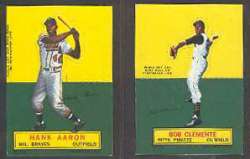Below are short bits & pieces on sportscard & baseball trading card collecting.
Please wander around the website for more info, prices, values & images
on vintage baseball, football, basketball, hockey, sport and non-sports cards.

Team Autographed / Signed Baseballs
Team signed baseballs were the thing well before single-signed
balls exploded on the market.
What is a "Team Signed Baseball" ???
Simple answer: A ball with XXX signatures of a certain team
for a certain year. What is difficult is the XXX.
Baseball tons of roster moves make it nearly impossible to
"Get Them All".
Generally, team signed baseballs from early 1900's had 10 to 15
signatures, the 1940's that jumped to 18 to 25.
Joyce Sports Research Collection (Notre Dame) says "signatures must
include only members of a specific team from a specific year, and there
must be some approximation of completeness."
Not concrete but to me a "team ball" MUST have ALL the team's
STARS (unless a rookie or in season trade) and in today's market
at least 20, preferably more, and the manager.
Determining Age of Team Signed Balls
"Official" league balls have stamped signatures of current league
presidents on the "sweet spot".
Starting 1934/1935 balls were produced by Spalding (NL)
and Reach (AL). Rawlings took over in 1977/78.
Have a possible team roster at hand, ESPN & baseball-reference.com
have great sites), decipher a few signatures then solve the puzzle.
Note: You may be on that page now.
|


1967 Topps WHO AM I ?
Checklist & Values
Easy to see why the 1967 Topps "Who Am I ?" set is a favorite of both sports
and non-sport collectors. 44 cards featuring history's important figures
PLUS (4) of baseball's top stars: Mickey Mantle,
Babe Ruth, Sandy Koufax & Willie Mays !!! Do you recognize them ?

 Player on front covered with scratch-off disguise with silly, hair,
moustaches, hats, noses... and a clue to help kids guess.
More clues on back. NO disguise coating then NOT MUCH VALUE.
Player on front covered with scratch-off disguise with silly, hair,
moustaches, hats, noses... and a clue to help kids guess.
More clues on back. NO disguise coating then NOT MUCH VALUE.
 Shakespear, Abe Lincoln, George Washington, Einstein,
Queen Elizabeth, Joan of Arc, Julius Caesar, Columbus, Jackie Kennedy
& more...
Shakespear, Abe Lincoln, George Washington, Einstein,
Queen Elizabeth, Joan of Arc, Julius Caesar, Columbus, Jackie Kennedy
& more...

1967 Topps Who Am I?
Checklist & Prices
You may be on page right now.
|


1964 Topps Stand-Ups
Checklist & Values
One of Topps most popular 1960's test issues !!!
Blank-backed, unnumbered & standard size - cards were called
"Stand-Ups". "Stand-Ups" refers to a type of card that was die cut around
the player's picture. The background could be folded so the player's picture
could "stand up" alone.
1934-36 Batter Up and the 1951 Topps All-Star sets are 2 other popular
stand-up issues.
22 of the 77 cards are single prints making them twice as scarce and much
higher in demand.
Thanks to the green and yellow borders and that most cards have been folded,
1964 Stand-Ups extremely difficult to obtain in high grade.

 On the left and right are images of a pack and box.
Set packed with 19 Hall-of-Famers including the Top-5: Mickey Mantle,
Willie Mays, Roberto Clemente, Hank Aaron & Sandy Koufax.
On the left and right are images of a pack and box.
Set packed with 19 Hall-of-Famers including the Top-5: Mickey Mantle,
Willie Mays, Roberto Clemente, Hank Aaron & Sandy Koufax.
Click for complete
1964 Topps Stand-Ups checklist and prices
Note: You may be on that page right now.
|
1

How long have sports cards been around ? (part 1)
The first baseball trading cards date back to 1869. For many years,
baseball cards were packaged in packs of tobacco as a way to increase sales
the same way that today prizes are packaged in boxes of cereal.
In the 1920's and 1930's, candy and gum companies started packaging baseball
cards in their products as well.
Baseball card production was virtually halted in the early 1940's due to paper
shortages created by World War II. The "Modern Era" of baseball cards began in
1948 when Bowman Gum Inc. offered one card and one piece of gum in a pack for a penny.
The first important football set was the Mayo set featuring college players
in 1984. Other than the 1935 National Chicle set no other key football set was
issued until 1948 when noth Bowman and Leaf produced sets.
© 1995-2019 "InterNet's Baseball Card Store" / Joseph Juhasz ... All Rights Reserved
|








